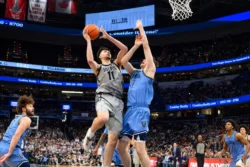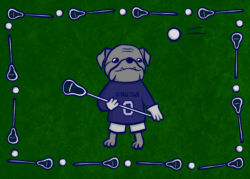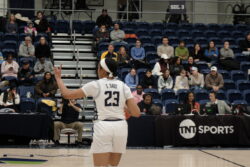On Thursday, Feb. 19, at around 3 p.m., Jerian Grant, a senior and standout basketball player at the University of Notre Dame, asked his nearly 7,000 Twitter followers a simple question.
“Is my brother still on the Sixers?!?!”
It was a fair inquiry. His brother, Jerami, was is in fact still a member of the NBA’s Philadelphia 76ers, but that did not make Jerian’s question unreasonable.
In a matter of hours last Thursday, NBA fans and media members watched as eleven trades involving nearly 40 players were completed in the final moments of the 2015 NBA trade deadline, moves that shifted the league’s landscape dramatically, while igniting a firestorm of analysis and outright disbelief on social media. Jerami Grant may have stayed put, but Goran Dragic, Kevin Garnett, Michael Carter-Williams, Enes Kanter, Isaiah Thomas, Isaiah Canaan, Pablo Prigioni, Arron Afflalo, Brandon Knight, Tayshaun Prince, K.J. McDaniels, and a bevy of other notable NBA talent were told to pack and head to a new city.
I, like all NBA fans, was enthralled by this flurry of trades. To see the NBA’s elite—think general managers, team owners, and players who “pull the strings” like LeBron James—making moves like the NBA was going out of business at the conclusion of the 2015 season was captivating.
But then I thought about a guy like Steve Novak. The former New York Knick (and, thus, a player near and dear to my heart), had been a part of the day’s most complicated trade, an eight-player doozy that had sent picks, players, and money flying between three teams. After appearing in just 22 games this season with the Utah Jazz, Novak would be heading to Oklahoma City to join the Thunder—a change of scenery to say the least.
This is not a new occurrence for Novak. Before the Jazz, it was the Toronto Raptors, before that the Knicks; and before that, there was the San Antonio Spurs, the Reno Bighorns, the Dallas Mavericks, the Los Angeles Clippers, the Rio Grande Valley Vipers, and, of course, the Houston Rockets, where it all began for Novak back in 2006. For those keeping score at home, that is ten teams in nine years. Truly, job security at its finest.
Novak’s life, in a sense, has been based on the whims of the handful of power players at the head of every NBA front office he has served. Whenever a trade needs balancing, a young player is coveted, or a draft pick is needed, GMs scan their rosters and look for salaries like that of Novak’s: cheap and easy to unload. So, when Dennis Lindsey, the GM of the Utah Jazz, was trying to complete his stroke of genius on Thursday afternoon, Novak was an unsurprising inclusion. All business, all part of the game.
The irony here is clear. Why do a group of less than 50 people, all of whom are either well past their playing days—ex-NBA players are commonly front office executives—or never had playing days, get to dictate where and how upwards of 450 players, get to live their lives? Why did Dennis Lindsey get to pick up that phone on Thursday afternoon and tell Steve Novak that he was a goner?
It’s hard to approach this question without a little cynicism. First, these players get paid millions of dollars to play a game they love. When they lose their job, they don’t have to think about where their next meal is going to come from; instead, they likely are either being sent to another healthily paying job, or are preparing for retirement with their millions. For many, it is very difficult to feel sorry for someone who makes more in a season then they will in a lifetime.
Second, NBA players sign contracts allowing the madness we witnessed last week to happen. There is not a single transgression to be found in the deal that sent Steve Novak to Oklahoma City. He, like all NBA players, signs each new deal with full knowledge that at any time he could be released or traded.
But one cannot overlook the human element of the matter. A few years ago, I was flipping channels and stumbled across a profile of Steve Novak on the MSG network. Novak had just signed a new contract with the Knicks and was chatting about how his life seemed to have finally achieved some stability. He was recently married with a kid in tow, and seemed confident that his whirlwind tour may have reached its conclusion. In less than a year’s time, Novak would be sent north to Toronto.
Players like Novak—the NBA journeymen—need more protection. Longer-term contracts, more beneficial trade clauses, increased player options, and—dare I say—player input into management decisions, would transfer some of the power back to the players and away from the wand-wavers of the NBA’s front offices. The NBA may be a business, but its employees are still people. Let’s start treating them that way.





